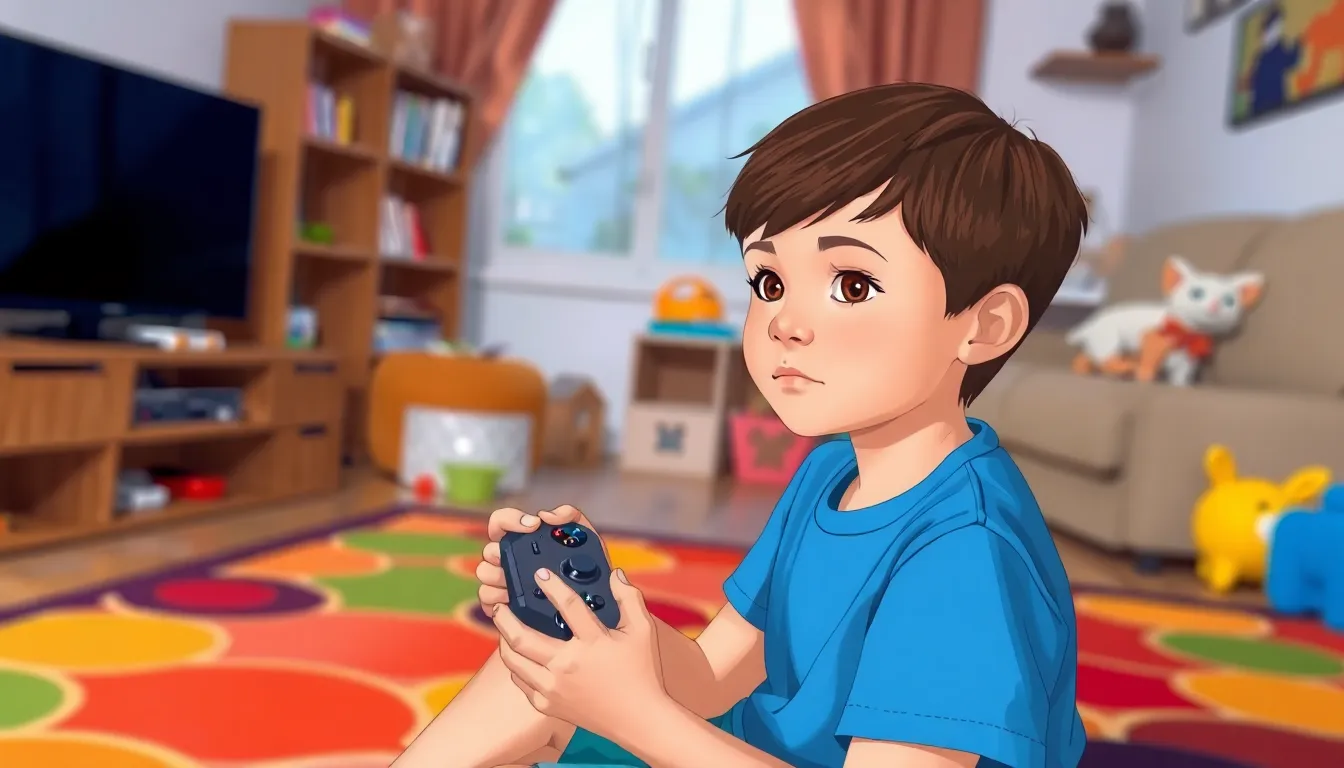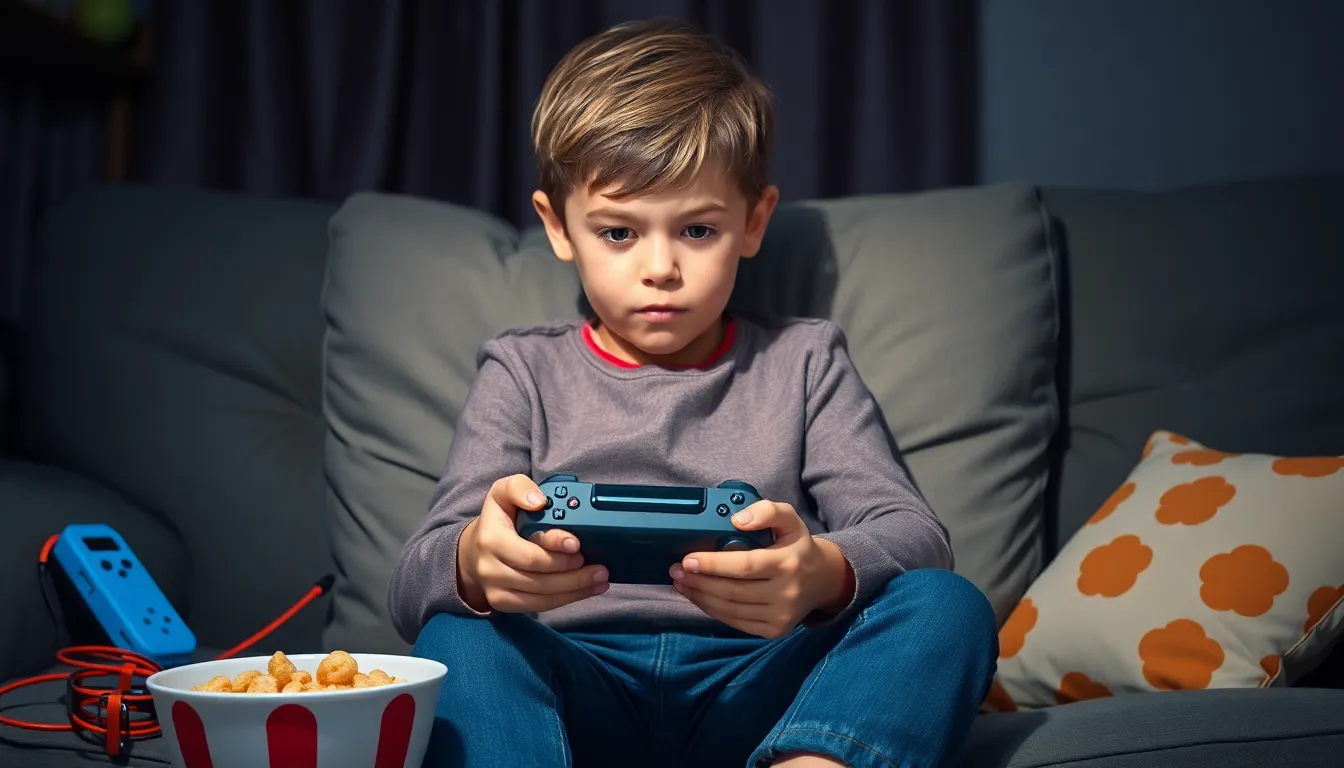In a world where kids can level up faster than their parents can say “screen time,” video games have become a staple of childhood. While they can spark creativity and improve hand-eye coordination, it’s crucial to hit pause and consider the darker side of this digital playground. What happens when the virtual world starts to overshadow real-life experiences?
From social skills that take a backseat to virtual quests to the sneaky rise of sedentary lifestyles, the negative effects of video games on child development are worth examining. Parents might find themselves wondering if those epic gaming marathons are worth the risk of turning their little ones into couch potatoes. So grab a snack, sit back, and let’s explore the not-so-glamorous side of gaming that could have lasting impacts on our children’s growth.
Table of Contents
ToggleOverview of Video Games in Childhood
Video games play a significant role in childhood experiences, impacting development in various ways. Many children engage with video games daily, making it essential to explore their effects on growth. Research indicates that excessive gaming can hinder social skills, as children may spend less time interacting face-to-face with peers. Moreover, increased screen time often leads to sedentary behavior, contributing to health issues like obesity.
Social interactions often decrease when children prefer virtual environments. Children who spend more time gaming may struggle with teamwork and communication. Strengthening these skills requires direct social engagement, which gaming often lacks.
There’s a notable correlation between gaming and attention span as well. Kids who frequently play video games may face challenges in focusing on tasks that require prolonged concentration. Academic performance may suffer due to distractions from gaming, particularly when homework and study time overlap.
Aggressive behavior is another concern linked to specific video game genres. Studies show that exposure to violent content can influence children’s attitudes and reactions. Parents should monitor game choices to reduce potential negative influences.
Mental health can also be affected by video game habits. Loneliness and anxiety may rise when gaming replaces outdoor play and socializing. Children benefit from balancing screen time with physical activity and real-life interactions.
Awareness of these factors helps parents make informed decisions about their children’s gaming experiences. Understanding the potential negative effects allows families to create healthier gaming habits, fostering a more balanced approach to technology in childhood development.
Psychological Impacts

Video games can significantly influence children’s psychological development. The exploration of their effects reveals important concerns regarding aggression and empathy.
Increased Aggression
Research shows a link between violent video games and increased aggression in children. Players may imitate hostile behavior observed during gameplay. Children exposed to frequent violent scenarios often display more aggressive thoughts and actions in real-life situations. Studies indicate that those who engage with violent games are more likely to resolve conflicts with aggression rather than dialogue. Additionally, desensitization to violence can occur, making aggressive behaviors appear more acceptable. Parents should note these patterns, ensuring awareness of how gaming content affects children’s behavior.
Decreased Empathy
Exposure to video games can diminish children’s ability to empathize with others. Engaging heavily with characters in conflict-laden scenarios often leads to reduced emotional responses. As children prioritize game objectives over interpersonal connections, they may struggle to understand others’ feelings. Research suggests frequent gameplay correlates with a lower capacity for compassion. Scarcity of real-life interactions further hampers empathetic development, potentially culminating in difficulties in forming strong relationships. Awareness of these effects encourages parents to monitor gaming habits and foster healthier emotional growth.
Social Development Issues
Concerns regarding video games include their negative impact on children’s social development. Excessive gaming fosters isolation and hinders overall communication skills.
Isolation and Loneliness
Prolonged gaming sessions contribute to feelings of isolation. Children often prefer interactive screens over face-to-face interactions. Research indicates that gamers may engage less frequently with peers, which can lead to significant loneliness. Reduced social exposure affects personal relationships and teamwork skills. Socializing outside gaming environments declines, diminishing opportunities for building friendships and sharing experiences. Furthermore, younger children may struggle to develop essential social skills, as in-person interactions decrease.
Impaired Communication Skills
Limited real-life communication diminishes children’s ability to express themselves clearly. Frequent gamers often rely on online conversations, which lack non-verbal cues. This reliance affects their understanding of tone and body language, key aspects of effective communication. As a result, children’s verbal skills may lag behind those of their peers. Additionally, gaming environments often emphasize competition over collaboration, undermining teamwork abilities. Research suggests that these trends can lead to difficulties in navigating social settings. Effective communication hinges on practice, which can wane with excessive gaming hours.
Academic Performance Concerns
Excessive video gaming can lead to significant concerns regarding academic performance. Continuous exposure to gaming can detract from time spent on homework and studying.
Reduced Focus and Concentration
Frequent gaming affects children’s ability to concentrate in school. A study by the American Psychological Association found that prolonged game play correlates with reduced attention spans in children. Difficulty focusing on classroom activities arises as gaming harnesses fast-paced stimuli. Teachers often notice a marked decline in students’ ability to engage during lessons. Many children struggle to complete tasks and maintain sustained attention, impacting their overall learning experience.
Lower Academic Achievement
Engagement with video games can contribute to lower academic achievement over time. Research conducted by the National Institute on Media and the Family indicates that students who spend more than three hours gaming daily score lower on standardized tests. Academic neglect typically occurs as gaming consumes valuable time meant for studying or completing assignments. Grades may suffer as children prioritize gaming over educational responsibilities. Teachers and parents observe a connection between extensive gaming habits and declining grades, emphasizing the need for balance in children’s digital engagement.
Physical Health Effects
Excessive video gaming poses various risks to children’s physical health. These can manifest in both sedentary lifestyles and sleep disruptions, leading to long-term consequences.
Sedentary Lifestyle
Sedentary lifestyles often develop from prolonged video gaming, where children spend hours sitting and engaging with screens. Reduced physical activity can lead to obesity, muscle weakness, and poor cardiovascular health. The American Heart Association recommends at least 60 minutes of moderate to vigorous physical activity each day for children, a goal often neglected during excessive gaming sessions. Research shows that children who play video games for more than three hours daily exhibit a higher likelihood of weight gain compared to peers who engage in physical activities. Parents should encourage breaks and active play to combat these trends.
Sleep Disruption
Sleep disruption frequently occurs among children who game excessively, impacting their overall health and development. Games can heighten excitement and make it difficult for kids to wind down at night. Studies indicate that blue light emitted from screens interferes with melatonin production, delaying sleep onset. Insufficient sleep can result in irritability, poor concentration, and decreased academic performance. The National Sleep Foundation emphasizes the importance of a consistent sleep schedule, recommending that children aged 6 to 13 receive 9 to 11 hours of sleep nightly. Prioritizing healthy sleep habits can counteract the negative effects of gaming on children’s rest.
The impact of video games on child development is multifaceted. While they can offer benefits, the negative effects often overshadow these advantages when gaming becomes excessive. Children may face challenges in social interactions, academic performance, and even mental health due to prolonged screen time.
Parents play a crucial role in guiding their children’s gaming habits. By promoting a balanced approach that includes physical activity and face-to-face interactions, they can help mitigate the adverse effects. It’s essential to remain vigilant about the time spent on gaming and encourage healthier alternatives. Prioritizing a well-rounded lifestyle will support children’s overall growth and development in an increasingly digital world.




